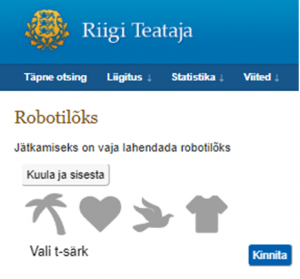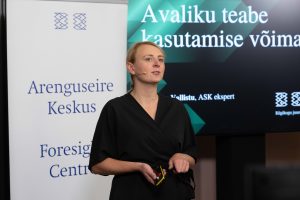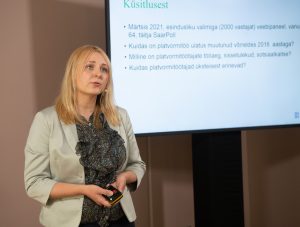How can we make the data collected by the public sector more useful for both the Estonian society and every individual is the question asked at the Foresight Centre data conference “How could data serve us better?”.
News
Technical access restrictions, such as CAPCHAs and multiple download restrictions, are hindering the availability and refining of public information, shows the study “Trends in Access to Public Sector Information” that will be published by the Foresight Centre on Tuesday, 18 October.
According to the study “Trends in access to public sector information”, published by the Foresight Centre, the balance between the data protection requirements and the right to obtain public information is askew in Estonia. The implementation of the European Union General Data Protection Regulation (GDPR) has reduced the availability of data even further.
The issue of data freedom needs clearer accountability and advocacy in Estonia, the study “Trends in Access to Public Sector Information” to be presented by the Foresight Centre this Tuesday shows. According to the study, restrictions on public information have increased during the last 20 years.
On Tuesday, 18 October, the Foresight Centre will publish the study “Trends in Access to Public Sector Information”, which gives an overview of the legal environment in Estonia in terms of using public information. The study shows that access to public information is uneven across agencies.
The brief report of the Foresight Centre “Roadmap of Targeted Automatic Subsidies in Estonia” shows that if the government used the data kept in its registers, it would be possible to pay family and energy subsidies automatically and only to those who really need them, and to make the use of finances and the activities of the state more effective. Implementation of the subsidies based on automated data analysis and automatic decisions is mainly hindered by the restrictions in place on the use of data.
Datafication of the Estonian society creates ever increasing challenges both for public and private sectors, says the Foresight Centre brief report “Pitfalls of Using Public Data in Estonia”. The crucial pitfalls highlighted in the report concern the different standards applied to national data bases and the casual setting of access restrictions.
According to the Foresight Centre report “Long-term Impact of the Russo-Ukrainian War on Estonia. Population, Integration, Foreign Trade”, which was published today, Estonia must take into account that many war refugees will remain in Estonia for an indefinite time. The Centre drew up scenarios about 10,000, 30,000 and 60,000 war refugees remaining in Estonia.
According to the Foresight Centre brief report “Long-Term Prospects of Integration of War Refugees in Estonia”, the experts of integration think that the war refugees who have arrived in Estonia are more likely to integrate with the Estonian community than with another language community. Integration would be supported above all by a quick entry into the labour market, but experts are more sceptical about the capacity of the Estonian social and education system to provide sufficient support for integration.
The Foresight Centre study “Platform Work in Estonia in 2021” shows that the government lacks a detailed overview of platform workers and the extent of the tax gap relating to it. If the share of platform work grows even more in the future, an increasing part of such workers will remain without social protection.

 An independent think tank at the Riigikogu
An independent think tank at the Riigikogu 







